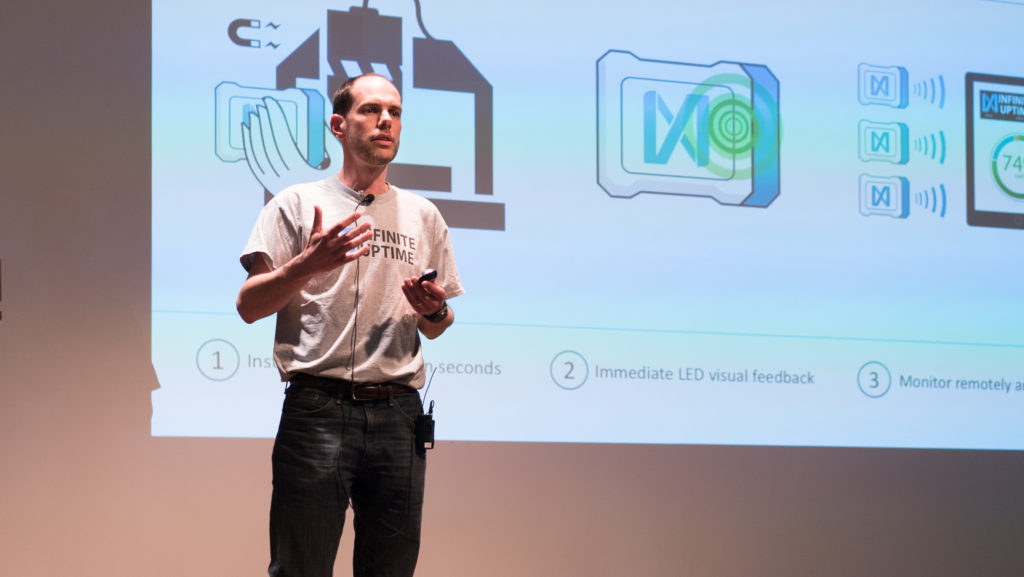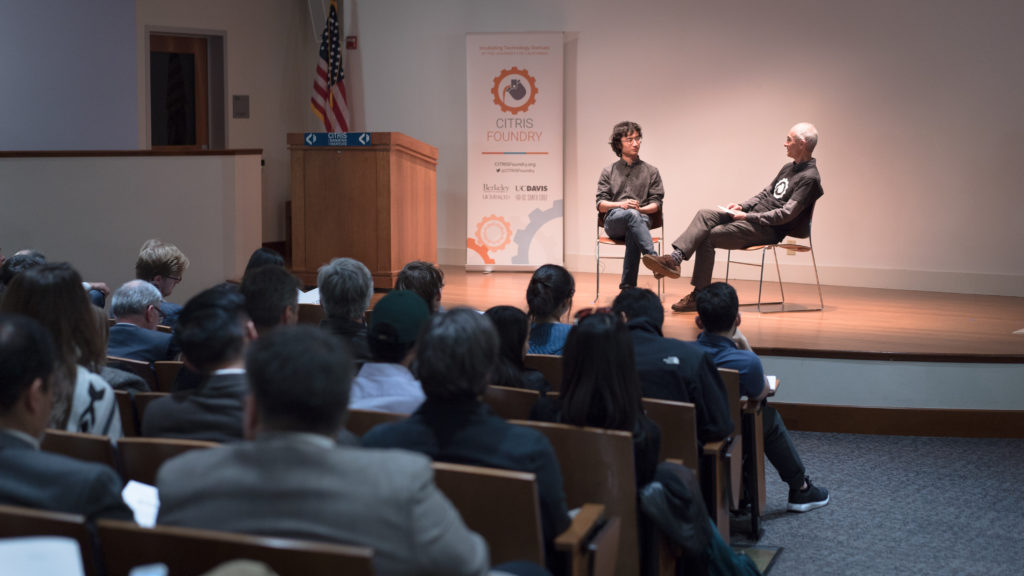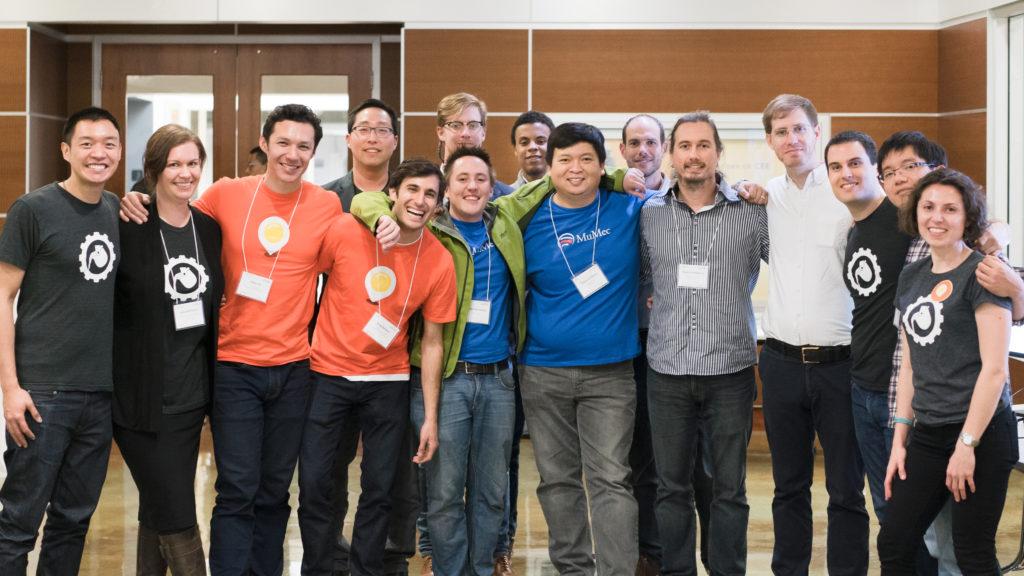
This week the CITRIS Foundry, SCET’s entrepreneurship partner and the UC system’s accelerator for founders building transformative technology companies, held its biannual Demo Day, where its Spring 2016 cohort pitched their business ventures and displayed progress they had made over the past year.
The Spring 2016 Cohort represented the sixth batch of startups to participate in the Foundry’s program, which focuses on helping students through deep, customized mentorship and access to a variety of resources such as maker space and networking, as well as seed funding. The Foundry’s success can be seen in the fact that since 2013, thirty-seven startups have raised more than $35M in follow-on funding, with more than two thirds of participating teams raising money before they graduate from the accelerator program. The CITRIS Foundry offers over $100,000 in in-kind resources, such as banking, cloud storage services, and large spaces to build and test hardware products. Remarkably, companies have raised on a 200X multiple from seed funding. This previous year’s Spring 2016 batch consisted of six startups, which we briefly feature below.
Following introductions, the CITRIS Foundry’s co-founder, Patrick Scaglia sat with David Lu, a graduating member of the Spring 2014 batch to show an example of the success startups see after they move on from the accelerator. David, an Atmospheric Science major at Berkeley, was inspired when he traveled to Beijing to create a technology able to detect and avoid toxic air. Together with his batch-mates, David spent twelve months at the CITRIS Foundry iterating a sensor design and packaging to develop and commercialize the world’s most accurate and low cost particulate matter (PM) sensor. His company, Clarity is now in talks with large metropolitan cities around the world to install air-quality sensor networks. David remarked that the network and resources the CITRIS Foundry provided Clarity played a crucial role in helping them commercialize and target their technology towards a profitable strategy.

Patrick Scaglia, Co-Founder of CITRIS Foundry, has a Fireside Chat with David Lu
This Year’s Presenting Startups:
- Genedit: develops novel engineering and delivery approaches to better enable CRISPR-Cas9 for human therapeutics. Discovered at UC Berkeley in 2012, it enables precisely targeted genome editing. CRISPR-based therapeutics have the potential to cure hundreds of genetic diseases, and GenEdit is actively working on how to safely and efficiently deliver CRISPR-Cas9 treatments into the human body.
- Nourish Technologies: builds automated fast food restaurants that serve super convenient, healthy and delicious food – it aims to disrupt the fast-food model completely by using automated machine operated restaurants to offer hot, made-to-order food efficiently, in quick time. Currently testing products in public spaces to check the viability of their business, Nourish has already had two rounds of seed funding, and is set to operate at UC Berkeley in Fall 2017.
- MuMec: Makes wireless transceivers that reduce power consumption by up to 100x for extended battery life of wireless devices – it requires drastically lower operating power for use with Bluetooth LE and LoRa wireless protocols. By integrating Radio Frequency MEMS technology with standard CMOS design, MuMec’s radios offer a 10-100x reduction in power consumption, allowing consumer devices and IoT applications to extend battery life, enable always-on wireless connectivity, and operate entirely on scavenged power.
- SmartPhage: Mines the natural microbiome to provide targeted and effective identification and control of resistant bacteria – it is often unrecognized that 50% of antibiotic prescriptions written in the outpatient setting are unnecessary. In 2013 in the United States, 2 million children & adults became infected with antibiotic resistant bacteria, and at least 23,000 died as a direct result, whereas in the EU, drug-resistant bacteria are estimated to cause 25,000 deaths and cost more than US$1.5 billion every year in healthcare expenses and productivity losses. SmartPhage is building an automated platform for the development of custom phage products to enable the development of effective, precise therapies based on modern disease models, so that such errors and diseases that often go unnoticed or unaddressed can be dealt with.
- Infinite Uptime: is a vertically integrated, industrial IoT solution provider to the manufacturing industry that aims to increase up-time, productivity, monitor machines and predict failures. It provides an all in one industrial solution with hardware, cloud analytics and control software to monitor equipment, diagnose problems and drive smart decision making. Its Industrial Data Analytics Platform (IDAP) provides effectiveness calculations, automated failure mode detections (to define parameters and detect non-conformance), trend analysis (using big data to identify productivity trends), ISO compliance reporting and multi-tool functionality to enable companies to effectively use IoT in their businesses.
- Numericcal: Enables companies to leverage deep learning on standard mobile and IoT platforms. It believes the current computational infrastructure is inadequate for development of timing-aware systems, and aims to provide a highly transparent hardware/software design platform for productive design of high-performance numerical computation with predictable and repeatable timing characteristics.

CITRIS Foundry’s Spring 2016 Cohort & Staff
Inspired by the progress made over the past 12 months using the CITRIS Foundry’s resources, the startups are keen to grow and move on to disrupt various technology sectors around the world. For CEO’s like Greg Becker of Nourish, the CITRIS Foundry’s mentorship and weekly check-ins were crucial in providing important feedback, and such advice in his opinion, is highly undervalued. Such is Greg’s determination to displace inconvenient, inefficient fast-food that Greg goes to Starbucks every month to buy a sandwich, just to experience the very frustration and inefficiency he aims to displace.
The SCET and CITRIS and the Banatao Institute wish all the best to the Cohort of Spring 2016! The CITRIS Foundry’s next cohort deadline, for Spring 2017 is this Sunday at 11:59pm. Interested startups can explore how to apply to the batch here.
All photographs taken by Adriel Olmos, media-specialist at CITRIS.
